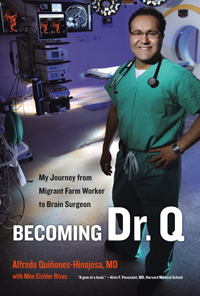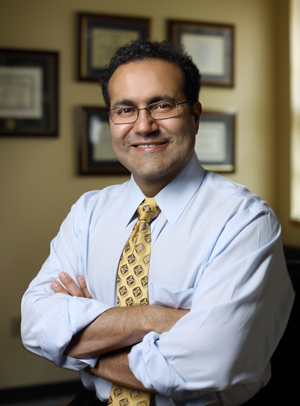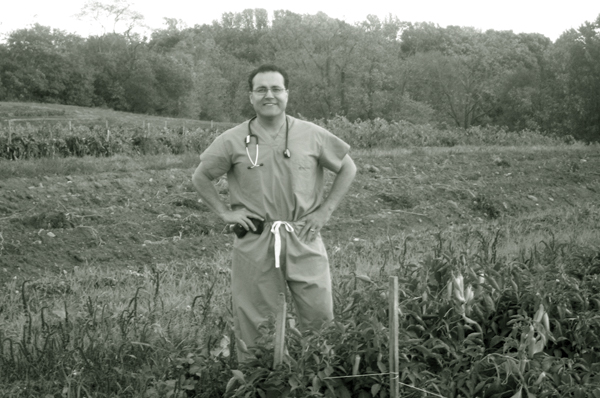Dr. Q, Former UCSF Medical Resident, Returns to Campus on October 10

As part of activities to celebrate diversity at UCSF, former UCSF medical resident and stem cell researcher Alfredo Quiñones-Hinojosa, MD, will return to campus to speak about his time at UCSF on Monday, Oct. 10.
Quiñones-Hinojosa spent one of the most formative periods of his life at UCSF, where he first became “Dr. Q” – a nickname that stuck and has followed him ever since. He recently wrote a book called “Becoming Dr. Q” about his experiences in college, medical school, residency at UCSF, and on to Johns Hopkins University in Baltimore, where he now directs the Brain Tumor Surgery and Pituitary Surgery programs and heads the Brain Tumor Stem Cell Laboratory.
As anyone familiar with medical education can tell you, the life of a doctor begins long before medical school. By the time they reach medical school, medical students have spent years preparing with undergraduate coursework and many already have had significant academic and often clinical exposure to modern medicine. Nor does this education end at graduation. Four years of medical school barely marks the halfway point in training for many physicians, who continue on to residencies in their chosen specialties that can take years to complete.

Alfredo Quiñones-Hinojosa, MD
Much of the training that takes place at UCSF is focused on these residents and postdocs, who come to the university from diverse backgrounds and medical schools to conduct research and complete the next phase of their training. More than 1,400 medical residents and clinical fellows train at UCSF every year. Then they leave to go into junior faculty positions all over the globe.
Child of a Migrant Farm Worker
Few UCSF residents began life as Quiñones-Hinojosa did: as an illegal immigrant from Mexico and the son of a migrant farm worker who was raised in California’s Central Valley fields.
As a boy, he picked tomatoes and cotton during the day and at night studied basic English with a dictionary. He put himself through community college first and then matriculated to UC Berkeley, graduating class valedictorian. From there, he attended medical school at Harvard University, where he graduated cum laude, arriving at UCSF in 1999 to do a neurosurgical residency. Here he focused on the surgical treatment of primary and metastatic brain tumors and also completed a postdoctoral fellowship in developmental and stem cell biology – overcoming his own hardships along the way.
“Dr. Q is the most optimistic person that I have ever met. His optimism even prevailed in the face of severe personal challenges,” said Esteban Burchard, MD, MPH, a professor in the schools of pharmacy and medicine, who worked closely with Dr. Q when he was at UCSF and Harvard.
Today, Quiñones-Hinojosa focuses on fighting brain cancer, both through surgery and research. His clinical work emphasizes brain mapping during surgery to protect the motor and speech function of patients having tumors removed. He also uses minimally invasive surgical approaches to remove pituitary and skull base tumors, and his research efforts focus on the role of stem cells in the origin of brain tumors and the potential these cells offer for fighting brain cancer and regaining neurological function.
Learning Valuable Lessons at UCSF
Quiñones-Hinojosa recalls his tenure at UCSF as some of the most formative in his career – some of the best and toughest times that taught him a few of the most valuable lessons a doctor can ever learn. One such lesson, he said, was that a patient may need empathy as much as expertise.
He learned this lesson in a particularly hard way. A near tragedy had befallen him when he was accidentally stabbed with a large bore needle while working with a patient. The needle had previously been used to drain fluids from a patient who had HIV, hepatitis B and hepatitis C, potentially exposing Quiñones-Hinojosa to these viruses. He started to take a cocktail of antiretrovirals to prevent HIV infection – standard practice for needlestick injuries.
The drugs made him sick, and the long hours without a break in the operating room exacerbated this. The only way to prevent feeling sick was to completely stop eating. He lost dozens of pounds as he continued his full-time surgical and research schedule, all the while facing the stress of not knowing his HIV status. More than once, he said, the stress and angst boiled over. The worst occasion came when he was consulting with a confused patient. He grew impatient and short – something he recognized immediately and worked to rescind.
“That patient was scared,” said Quiñones-Hinojosa, “and I made it worse.”
He did not contract any of the viruses in the end, but he recalls this as among the most valuable lessons in his entire training. As a doctor your patients should always come first, he said. It doesn’t matter what’s happening in your personal life. That experience is one of several that Quiñones-Hinojosawill discuss in his talk on Monday, titled, “From Mentor to Tormentor: Crossing the Fine Line.”
This event is scheduled for 2:30 to 3:30 p.m. in Health Sciences West 303 on the UCSF Parnassus campus. A reception will follow the lecture.

Related Links:
Diversity Celebrations at UCSF
UCSF Department of Neurological Surgery
UCSF Graduate Medical Education
University of California Press page on the book